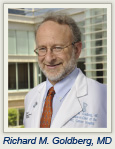Findings presented at the 2012 Gastrointestinal Cancers Symposium will impact the future care of patients with these malignancies. The ASCO Post has summarized some of the most newsworthy data in the following briefs.
In the phase III GRANITE-1 trial (n = 656), single-agent treatment with everolimus (Afinitor) in previously treated patients with advanced gastric cancer did not significantly improve overall survival, vs best supportive care. Overall survival was 5.4 months with everolimus and 4.3 months with best supportive care (P = .1244). Everolimus did, however, reduce the risk of progression by 34% (P < .0001), although the median progression-free survival was 1.68 vs 1.41 months, respectively.1
In the phase III NCIC CTG/AGITG CO.20 trial (n = 750) in metastatic chemotherapy-refractory KRAS wild-type colorectal cancer, the addition of the novel multitargeted tyrosine kinase inhibitor brivanib to cetuximab (Erbitux) did not improve overall survival, the primary endpoint, though it did improve progression-free survival. Median overall survival was 8.8 months with brivanib/cetuximab vs 8.1 months with cetuximab alone (P = .12). Median progression-free survival was 5.0 vs 3.4 months, respectively (P < .0001), a 28% reduction in risk.2
The Korean AMC 0101 trial (n = 640) aimed to determine if adjuvant chemotherapy for grossly serosa-positive advanced gastric cancer could be improved with four strategies: (1) adding cisplatin, (2) prolonging the administration of low-dose oral fluoropyrimidine, (3) starting chemotherapy early, and (4) giving it intraperitoneally. Postoperative intraperitoneal cisplatin and early mitomycin plus long-term doxifluridine plus cisplatin, compared to mitomycin plus short-term doxifluridine, significantly improved relapse-free survival (HR = 0.729; P = .0092) and overall survival (HR = 0.768; P = .0365) in the study’s long-term (median of 6.6 years) follow-up.3
The randomized double-blinded placebo-controlled phase II global SPACE trial (n = 307) evaluated the efficacy of sorafenib (Nexavar) in combination with transarterial chemoembolization using doxorubicin-eluting beads in patients with intermediate-stage hepatocellular carcinoma. The study met its primary endpoint of improvement in time to progression, with a hazard ratio of 0.797 (P = .072). Time to vascular invasion/extrahepatic spread was reduced by 28% (P = .076), but median overall survival had not been reached in either arm and was not significantly different between arms. A higher number of early transarterial chemoembolization discontinuations were seen in the sorafenib arm in non-Asian regions, and the duration of sorafenib treatment was longer in Asian regions, associated with greater efficacy.4
Stereotactic body radiation therapy as an alternative to radiofrequency ablation, achieved excellent local control, with low toxicity, for the treatment of primary and metastatic liver tumors in a study from the University of Michigan. Stereotactic body radiation therapy allows conformal delivery of ablative doses while sparing normal liver tissue. In a retrospective comparison with radiofrequency ablation in 189 patients, freedom from local progression was observed in 93% of the stereotactic body radiation therapy group and 86% of the radiofrequency ablation group at 1 year, and in 84% and 83%, respectively, at 2 years. With radiofrequency ablation, tumor size ≥ 3 cm had worse outcomes, whereas neither tumor size nor treatment dose predicted for outcomes with stereotactic body radiation therapy. In particular, stereotactic body radiation therapy may be more effective than radiofrequency ablation for the local control of large liver tumors, in whom it reduced recurrences by 69% (P = .03).5 ■
References
1. Van Cutsem E, Yah KH, Bang YJ, et al: Phase 3 trial of everolimus in previously treated patients with advanced gastric cancer: GRANITE-1. 2012 Gastrointestinal Cancers Symposium. Abstract LBA3. Presented January 19, 2012.
2. Siu LL, Shapiro JD, Jonker DJ, et al: Phase III randomized trial of cetuximab plus either brivanib alaninate or placebo in patients with metastatic chemotherapy refractory K-RAS wild-type colorectal carcinoma: The NCIC Clinical Trials Group and AGITG CO.20 trial. 2012 Gastrointestinal Cancers Symposium. Abstract 386. Presented January 21, 2012.
3. Kang Y-K, Ryoo B-Y, Chang H-M, et al: Update of AMC 0101 study: A randomized phase III trial of intraperitoneal cisplatin and early mitomycin-C plus long-term doxifluoridine plus cisplatin versus mitomycin-C plus short-term doxifluridine as postoperative adjuvant chemotherapy for grossly serosa-positive advanced gastric cancer. 2012 Gastrointestinal Cancers Symposium. Abstract 4. Presented January 18, 2012.
4. Lencioni R, Llovet JM, Hang G, et al: Sorafenib or placebo in combination with transarterial chemoembolization (TACE) with doxorubicin-eluting beads (DEBDOX) for intermediate-stage hepatocellular carcinoma: phase II randomized, double-blind, placebo-controlled SPACE trial. 2012 Gastrointestinal Cancers Symposium. Abstract LBA154. Presented January 20, 2012.
5. Liu E, Stenmark MH, Lee OE, et al: Stereotactic body radiation therapy as an alternative to radiofrequency ablation for the treatment of primary and metastatic liver tumors. 2012 Gastrointestinal Cancers Symposium. Abstract 158. Presented January 20, 2012.

 Richard M. Goldberg, MD, of The Ohio State University Medical Center, chaired the steering committee of the 2012 Gastrointestinal Cancers Symposium in San Francisco, which attracted approximately 4,000 registrants who viewed data from some 700 scientific abstracts. The ASCO Post asked Dr. Goldberg...
Richard M. Goldberg, MD, of The Ohio State University Medical Center, chaired the steering committee of the 2012 Gastrointestinal Cancers Symposium in San Francisco, which attracted approximately 4,000 registrants who viewed data from some 700 scientific abstracts. The ASCO Post asked Dr. Goldberg...